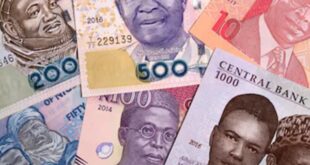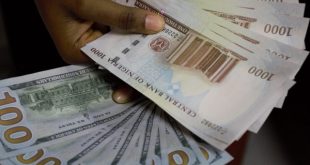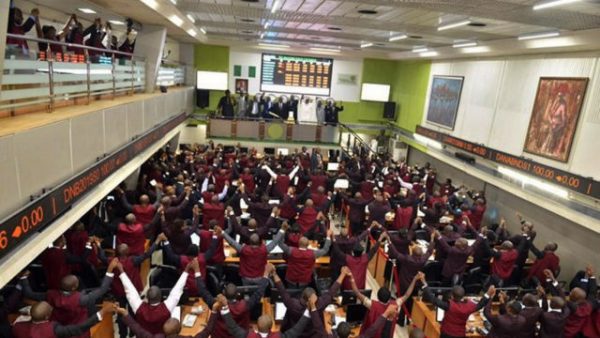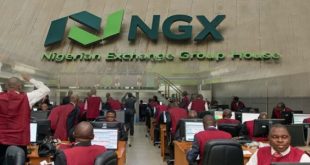
The naira rebounded against the United States dollar on Wednesday at the official and parallel markets, with the local currency recording a significant gain against the greenback at the black market.
This came as the Central Bank of Nigeria announced the final settlements of all valid foreign exchange backlogs, fulfilling a key pledge of the apex bank governor, Mr. Olayemi Cardoso, to process an inherited backlog of $7bn in claims.

The Acting CBN Director, Corporate Communications, Mrs. Hakama Sidi Ali, who disclosed this in Abuja on Wednesday, recalled the central bank had recently cleared $1.5bn from the backlogs.
On Wednesday, the naira closed trading at 1,410/dollar at the parallel market and N1,492 at the official Nigerian Autonomous Foreign Exchange Market, according to data compiled from the FMDQ Securities Exchange.

The gain recorded by the naira at the official market represents an appreciation of N68 or 4.5 per cent, from the N1,560/$1 recorded on Tuesday at NAFEM, and a gain of 13.5 per cent or N190 at the parallel market.
According to findings by media source, the exchange rate has been gaining lately as speculators begin to dump their dollar stocks, following waning demand by prospective buyers amid CBN clampdowns.
A string of circulars by the Central Bank of Nigeria in recent weeks and months have helped to plug leakages and blocked loopholes previously explored by currency speculators and racketeers.
Also, the recent clampdowns on the activities of illegal BDC operators in Lagos, Abuja and Kano by the operatives of the Economic and Financial Crimes Commission have helped to reduce the volatility of the naira.
A Bureau De Change Operator at Wuse 2, Abuja, Ibrahim Yahu, said on Wednesday that the greenback was bought at the rate of N1400/$1 and sold at N1500/$, allowing operators to make a spread of N100/$1.
He said, “The highest I can buy from you is N1400/$ but we are selling at N1500/$.
He noted that some persons bought at the rate N1,300/$ during the daily trading activity.
Another currency trader, Malam Musa Yahyah, at the Central Business District in the FCT, expressed mixed feelings about the new rate, stating that some traders were forced to sell at loss due to a waning demand for the greenback.
In Lagos, a currency trader at Allen Avenue, Ikeja, Mustafa Ibrahim, said the waning demand for the dollar, partly driven by the commencement of dollar sale to BDC operators at the rate of 1,300/dollar, had further weakened demand for the greenback.
He said most traders bought and sold the dollar at N1350 and N1450 on Wednesday. According to Ibrahim, the local currency may reach a new high of 1,200/dollar in weeks if the trend continues.
Also, Mallam Abubakar Salisu, who sells FX at the Murtala Muhammed Airport, Lagos, said the naira-dollar exchange rate at the parallel market had been fluctuating in recent times due to the activities of the CBN and the EFCC.
“As of today, many of us bought and sold at 1,400/dollar and N1,450/dollar. The rate is still volatile but many of us are anxious to sell because we know the dollar will soon crash. The only challenge is that many us bought the FX when the rate was around N1,600, so we are concerned about the loss. We are seeking to minimise the loss,” he said.
Meanwhile, the intraday high closed at N1,620 per dollar for the spot on Tuesday while the intraday low closed at N1,350/$1 on the same day.
The daily foreign exchange market turnover increased to $268.29m from $195.13 million recorded on Tuesday.
On Tuesday, media reported that forex turnover at the official foreign exchange market increased to $11.43bn within two months of trading, following fresh reforms by the CBN.
An analysis of reports and data of daily forex transactions recorded on the website of FMDQ Securities, a platform that publishes official foreign exchange trading in the country, indicated that the figure increased by 185.75 per cent or $7.43bn between January and March 15th, 2024.
The improved liquidity at NAFEM followed a directive by the CBN on February 1, 2024, asking banks to sell their excess dollar stock to improve liquidity in the FX market within 24 hours.
The naira has continued to appreciate against the dollar following some foreign exchange measures put in place by the Central Bank of Nigeria.
Some of the FX reforms include efforts made at achieving a willing buyer-willing seller market; removal of all limits on margins for the International Money Transfer Operator remittances; introduction of a two-way quote system and the broad reforms in the Bureau De Change segment of the market to restore stability, enhance transparency, boost of supply, and promote of price discovery in the Nigeria Autonomous Foreign Exchange Market.
The pressure on the naira/dollar exchange rate is beginning to ease as Nigeria’s external reserves have sustained growth in one month.
Data from the CBN showed that the foreign currency reserves increased by 3.62 per cent to $34.37bn as of March 12, 2024 from $33.17bn recorded at the beginning of February 2024.
The CBN recently announced a remarkable upswing in Diaspora remittances, soaring by 433 per cent to reach $1.3b in February, compared to $300m in January.
CBN announces
Meanwhile, acting CBN Director, Sidi Ali, said the clearing of the FX backlogs followed a significant increase in external reserves.
She said the month-on-month increase in the reserves was driven by a marked advance in remittance payments by Nigerians overseas, as well as higher purchases of local assets, including government debt securities by foreign investors.
Ali emphasised that meticulous efforts were undertaken to settle these outstanding transactions.
The apex bank noted that independent auditors from Deloitte Consulting meticulously assessed each transaction in the $7bn FX backlog, ensuring that only legitimate claims were honored.
It noted that all invalid transactions were promptly flagged for further scrutiny by relevant authorities.
Cardoso had recent underscored the importance of clearing the FX backlog to restore credibility and confidence in the Nigerian economy.
According to the CBN statement, the clearance of the foreign exchange transactions backlog aligns with the comprehensive strategy outlined during last month’s Monetary Policy Committee meeting.
The primary objectives include stabilising the exchange rate and mitigating imported inflation. By doing so, the CBN aims to bolster confidence in the banking system and stimulate economic growth.
Cardoso was said to have further communicated the expectations during a conference call with foreign portfolio investors, emphasising sustained increases in Nigeria’s foreign currency reserves and improved liquidity in the foreign exchange market.
“It was important that we go through an independent and credible process that would determine the authenticity of those obligations, and, at this point, I can tell you that we have now cleared all genuine, verifiable transactions. This encumbrance to market confidence in the country’s ability to meet its obligations is now totally behind us,” he added.
The CBN action signifies a pivotal moment in the financial landscape, paving the way for a more resilient and stable economy.
As the nation moves forward, the successful clearance of the FX backlog serves as a beacon of confidence for investors and businesses alike.
The statement partly read, “the Central Bank of Nigeria has announced that all valid foreign exchange backlogs have now been settled, fulfilling a key pledge of the CBN Governor, Mr. Olayemi Cardoso, to process an inherited backlog of $7bn in claims.
“Clearance of the foreign exchange transactions backlog is part of the overall strategy detailed in last month’s Monetary Policy Committee meeting to stabilise the exchange rate and thereby curb imported inflation, spurring confidence in the banking system and the economy. Cardoso used the MPC meeting and a subsequent conference call with foreign portfolio investors to set expectations for sustained increases in Nigeria’s foreign currency reserves and improved liquidity in the foreign exchange market.”
Banks
Meanwhile, some banks have asked their customers to submit tax clearance for the last three years when applying for Form A.
Form A, which is an application form designed by the Central Bank of Nigeria to pay for service transactions such as school fees, medical fees, and more, allows customers to purchase funds at the CBN or interbank rate to make payments for these services.
An email notification from Standard Chartered to its customers revealed that effective next month, they would be required to submit their TCC for the last three years when seeking forex via banks.
The notice titled ‘Further Update On Tax Clearance Certificate’ reads, “Following our previous communication on submission and verification of Tax Clearance Certificate for all FORM A applications, we wish to remind you of the requirement to provide your updated tax clearance certificate.
“Effective 1st of April, 2024, you are required to upload your 3 years TCC for 2021, 2022 and 2023 assessment year for all new and existing FORM A applications on the CBN trade monitoring system (TRMS). All submitted TCC will be verified by the state tax issuing authority before the application is approved.”
Fidelity Bank and Stanbic IBTC had also released similar circulars to their customers, urging them to submit their TCC to get approval for foreign exchange requests, such as Form A applications.
A Tax Clearance Certificate serves as evidence of compliance with tax obligations, ensuring adherence to the stipulations outlined in Section 85 (2) of the Personal Income Tax Act, Cap P8, LFN 2004 (as amended).
Recalled that a global investment bank, Goldman Sachs, had recently predicted that the Naira would appreciate to N1200 per US dollar in twelve months.
Goldman Sachs analysts, Andrew Matheny and Bojosi Morule disclosed this in their recent analysis of Nigeria’s current economic realities.
The US-based financial institution highlighted the recent upward interest rate adjustment by monetary authorities in Nigeria and a recent N1.6tn bill auction by the central bank as signals that the country is turning the tables on a previous unorthodox policy regime that hindered the naira from trading freely.
“These developments have prompted us to shift to a constructive outlook for the Naira, which our FX strategists expect to appreciate to NGN 1200 vs. the USD in 12 months,” Goldman Sachs said.
Goldman Sachs backed the recent monetary policy by the Nigerian government to rescue the Naira, which was described as ‘cheap’ or undervalued.
The analysts believed that the country’s foreign exchange crisis would be resolved if the government saw to monetary policies.
The Central Bank of Nigeria has unveiled several monetary policies.
The latest was the new draft guidelines for Bureau de Change operators in the last two months.
Also recently, Binance, a cryptocurrency, discontinued its Naira transactions over regulatory clampdown by the Nigerian government.
 MMS PLUS NG – Maritime, Aviation, Business, Oil and Gas News Online Newspaper with coverage in Maritime, Oil and Gas, Aviation, Power and Energy as well as Financial News
MMS PLUS NG – Maritime, Aviation, Business, Oil and Gas News Online Newspaper with coverage in Maritime, Oil and Gas, Aviation, Power and Energy as well as Financial News









